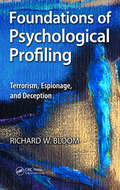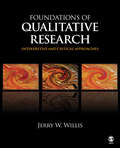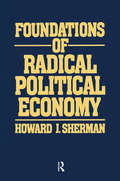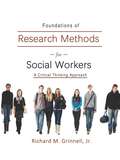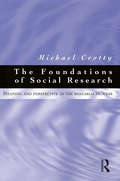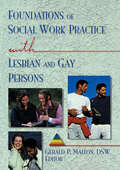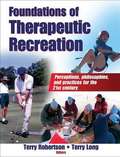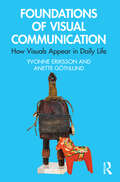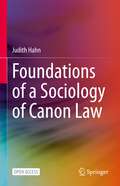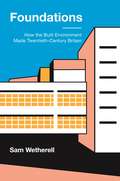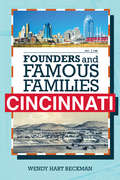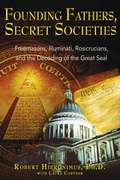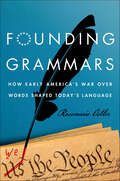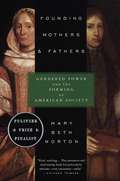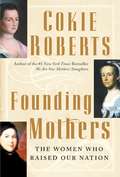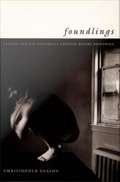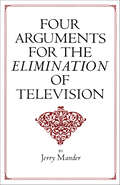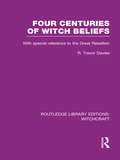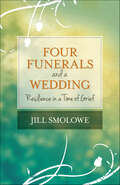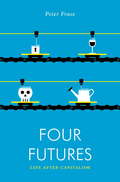- Table View
- List View
Foundations of Psychological Profiling: Terrorism, Espionage, and Deception
by Richard BloomProfiling is a hot topic today. The post-9/11 "War on Terrorism" has engendered political, ethical, and scientific controversy over its use. The proliferation of recent films, television programs, and books is a sociocultural indicator of widespread interest. Designed for a diverse audience including law enforcement officers, intelligence and secur
Foundations of Qualitative Research: Interpretive and Critical Approaches
by Jerry W. WillisFoundations of Qualitative Research introduces key theoretical and epistemological concepts replete with historical and current real-world examples. Author Jerry W. Willis provides an invaluable resource to guide the critical and qualitative inquiry process written in an accessible and non-intimidating style that brings these otherwise difficult concepts to life.
Foundations of Qualitative Research: Interpretive and Critical Approaches
by Jerry W. WillisFoundations of Qualitative Research introduces key theoretical and epistemological concepts replete with historical and current real-world examples. Author Jerry W. Willis provides an invaluable resource to guide the critical and qualitative inquiry process written in an accessible and non-intimidating style that brings these otherwise difficult concepts to life.
Foundations of Radical Political Economy
by Howard J ShermanFirst published in 1987. Similar in content to Sherman’s previous book, Radical Political Economy, it covers most of the same issues and reaches the same overall conclusion in favour of democracy and socialism. Many of the analyses and conclusions on particular subjects, however, have changed because of the flood of new literature in every area of radical political economy and because the world has changed. The most important issue is the prevention of nuclear war.
Foundations of Research Methods for Social Workers: A Critical Thinking Approach
by Richard M. GrinnellThis book is for beginning social work students as their first introduction to basic social work research methodology. Our philosophy is to provide a very inexpensive, easily accessible, straightforward, "student-friendly" book that promotes the use of the scientific method of inquiry process to create knowledge for our profession-the most commonly used framework to generate relevant, valid, and reliable social work knowledge. A conversational style of writing is used in an effort to provide simple, reader-friendly content.
Foundations of Social Research: Meaning and perspective in the research process (Social Research Practice Ser.)
by Michael CrottyChoosing a research method can be bewildering. How can you be sure which methodology is appropriate, or whether your chosen combination of methods is consistent with the theoretical perspective you want to take? The Foundations of Social Research links methodology and theory with great clarity and precision, showing students and researchers how to navigate the maze of conflicting terminology. The major epistemological stances and theoretical perspectives that colour and shape current social research are detailed: positivism, constructionism, interpretivism, critical inquiry, feminism and postmodernism. Crotty reveals the philosophical origins of these schools of inquiry and shows how various disciplines contribute to the practice of social research as it is known today. The Foundations of Social Research is essential reading for new and experienced researchers, students and professionals, in the social and health sciences.' .a wonderful piece of writing, expounding the philosophical and theoretical considerations of the research process for social researchers in a clear, fair minded and friendly way.'Clive Seale, Department of Sociology, Goldsmiths College, University of London
Foundations of Social Work Practice with Lesbian and Gay Persons
by Gerald P MallonFocusing on the pragmatic aspects of social work with gay and lesbian persons, this book offers a knowledge base of practice that will better prepare students and practitioners for working more competently and effectively with lesbians and gay men. Written by scholars and practitioners in the social work profession, Foundations of Social Work Practice with Lesbian and Gay Persons teaches you how to develop practice approaches that are sensitive to issues of sexual orientation as well as how to work with this population in the contexts of practice with individuals, couples, families, groups, communities, and organizations. The book’s sensible strategies and case studies provide you with critical information that will help you deal with homophobia and heterocentrism and enact a professional commitment to pursuing economic and social equality for diverse and at-risk client populations.A foundation-level text on social work practice with gays and lesbians, this book is designed to provide social work students, academics, and practitioners with an understanding of the values and ethics fundamental to practice with this group of clients. Foundations of Social Work Practice with Lesbian and Gay Persons summarizes the variety of issues, dynamics, and techniques required to work effectively with gay and lesbian clients who are at different points in their development and life cycles. To further help you in your practice, it also discusses: providing skilled professional assistance to gay victims of hate crimes how homophobia can prevent lesbians and gay men from receiving adequate services the obstacles social workers sometimes face when trying to integrate the core set of professional values and ethical principles into their practice practitioner self-disclosure regarding sexual identity developmental milestones for lesbian and gay persons alcohol and substance abuse among lesbians family therapy concepts of fusion and enmeshment same gender socialization assessing issues of sexual expressionCounselors, social workers, and students and academics in gay and lesbian studies will find that Foundations of Social Work Practice with Lesbian and Gay Persons greatly expands the social work knowledge base to disrupt the impact of institutional, individualized, and internal homophobia on social workers, their clients, and the institutions in which social workers practice. Its flexible and creative treatment approaches to therapy with sexual minorities are sure to help you sensitize your therapeutic techniques and improve the quality of care you deliver.
Foundations of Therapeutic Recreation
by Terry Robertson Terry LongFoundations of Therapeutic Recreation provides readers with a comprehensive introduction to the profession. The book draws on the combined wisdom, experience, and technical expertise of 23 professors and leaders in the field. From these contributors, readers gain access to diverse perceptions, philosophies, and practices for therapeutic recreation in the 21st century. The book showcases how the profession addresses various clients' needs throughout the life span through therapeutic programs, modalities, and activities. It also presents a wide range of applications, allowing readers to explore their personal and professional options; provides insight into the basic knowledge, attributes, and skills students need in order to thrive in the field; and delineates career paths in the profession and how a therapeutic recreation specialist works with various populations. Edited by Dr. Terry Robertson and Dr. Terry Long, Foundations of Therapeutic Recreationhas a comprehensive vision. The contributors present the broad scope of therapeutic recreation as research and practice across a diverse demographic of clients and consumers. The contributing authors explore various perspectives on therapeutic recreation and present standards and certification information that prepare students for the profession. Part I defines therapeutic recreation as a profession and provides an overview of its history and of the professional opportunities available. Part I also explores the profession's person-first philosophy and outlines the therapeutic recreation process as well as its models and modalities of practice and its allied professions. Part II delves into trends and issues, looking at demographics, economics, politics, and legislation as they affect the profession. It details international issues and paradoxes and concludes with future perspectives. Part III examines mechanisms for intervention from a number of perspectives, including orthopedic and neurological impairment, developmental disabilities, mental health, youth development, aging, and wellness. Foundations of Therapeutic Recreation contains chapter discussion questions to expand students' learning as well as Outstanding Professionals and Client Portraits sections to help students gain insight into various career paths. The book is accompanied by an instructor guide, PowerPoint presentations, and a test package available via the text's Web site to support the classroom instruction and enhance learning. The entire package gives students a solid grounding in the profession as it is today and a clear understanding of where the profession is headed tomorrow.
Foundations of Visual Communication: How Visuals Appear in Daily Life
by Yvonne Eriksson Anette GöthlundDrawing upon theories from visual studies, critical visual culture studies, and cognitive psychology, and with a special focus on gender and ethnicity, this book gives students a theoretical foundation for future work as visual communicators. The book takes a closer look at the interwoven character of perception and reception that is present in everyday visual encounters. Chapters present a wide variety of visual examples from art history, digital media, and the images we encounter and use in our daily lives. With the tools to understand how images and text make meaning, students are thus prepared to better communicate through visual media. This book serves as a main or supplementary text for visual communication or visual culture courses.
Foundations of a Sociology of Canon Law
by Judith HahnThis "Open Access" book investigates the legal reality of the church through a sociological lens and from the perspective of canon law studies, the discipline which researches the law and the legal structure of the Catholic Church. It introduces readers from various backgrounds to the sociology of canon law, which is both a legal and a theological field of study, and is the first step towards introducing a new subdiscipline of the sociology of canon law. As a theoretical approach to mapping out this field, it asks what theology and canon law may learn from sociology; it discusses the understanding of “law” in religious contexts; studies the preconditions of legal validity and effectiveness; and based on these findings it asks in what sense it is possible to speak of canon “law”. By studying a religious order as its struggles to find a balance between continuity and change, this book also contributes to the debates on religious law in modernity and the challenges it faces from secular states and plural societies. This book is of interest to researchers and students of the sociology of law, legal studies, law and religion, the sociology of religion, theology, and religious studies.This is an open access book.
Foundations: How the Built Environment Made Twentieth-Century Britain
by Dr Sam WetherellAn urban history of modern Britain, and how the built environment shaped the nation’s politicsFoundations is a history of twentieth-century Britain told through the rise, fall, and reinvention of six different types of urban space: the industrial estate, shopping precinct, council estate, private flats, shopping mall, and suburban office park. Sam Wetherell shows how these spaces transformed Britain’s politics, economy, and society, helping forge a midcentury developmental state and shaping the rise of neoliberalism after 1980.From the mid-twentieth century, spectacular new types of urban space were created in order to help remake Britain’s economy and society. Government-financed industrial estates laid down infrastructure to entice footloose capitalists to move to depressed regions of the country. Shopping precincts allowed politicians to plan precisely for postwar consumer demand. Public housing modernized domestic life and attempted to create new communities out of erstwhile strangers. In the latter part of the twentieth century many of these spaces were privatized and reimagined as their developmental aims were abandoned. Industrial estates became suburban business parks. State-owned shopping precincts became private shopping malls. The council estate was securitized and enclosed. New types of urban space were imported from American suburbia, and planners and politicians became increasingly skeptical that the built environment could remake society. With the midcentury built environment becoming obsolete, British neoliberalism emerged in tense negotiation with the awkward remains of built spaces that had to be navigated and remade.Taking readers to almost every major British city as well as to places in the United States and Britain’s empire, Foundations highlights how some of the major transformations of twentieth-century British history were forged in the everyday spaces where people lived, worked, and shopped.
Founders and Famous Families of Cincinnati
by Wendy Hart BeckmanBringing to life the founding families' histories, Founders and Famous Families of Cincinnati shares these intertwined and fascinating tales with readers near and far. This approachable overview of Cincinnati is a charming history of lives lived large - truly the Who's Who (as well as the When and Where) of Cincinnati - that, when considered together, made the Queen City the great place to live and work that it is today. From its very beginnings, Cincinnati offered an enticing combination of welcome and worldly sophistication. At one point, Cincinnati had more native-born residents than any other American city, a testament to the values that attracted and retained its citizens. Cincinnati's familial history is topped off with a sprinkling of the innovations that have impacted the rest of the world, including the first professional baseball team, the first pharmacy college, the first Jewish hospital, the first municipal university, the first concrete skyscraper, the first municipal railroad, and many more.
Founding Fathers, Secret Societies: Freemasons, Illuminati, Rosicrucians, and the Decoding of the Great Seal
by Laura E. Cortner Robert HieronimusAn exploration of the influence of secret societies on the formative documents and symbols of the United States• Reveals the Founding Fathers’ spiritual vision for America as encoded in the Great Seal• Traces the influence of the Iroquois League of Nations upon the Constitution• Exposes the deep connections the Founding Fathers had with the Freemasons and other secret societiesAll children growing up in America learn who the Founding Fathers were. Most, however, never learn of the founders’ connections to the Freemasons, the Rosicrucians, and other esoteric orders. In Founding Fathers, Secret Societies Robert Hieronimus investigates these important connections and how their influence can be traced throughout our most significant national documents and symbols, especially the Great Seal. He reveals in detail how the reverse of the Great Seal--which appears on the back of the one-dollar bill--is a blueprint that conveys the secret destiny of America. By understanding the kabbalistic meaning of the Great Seal’s reverse, he shows how our current era presents unique opportunities for the fulfillment of our Founding Fathers’ spiritual vision.
Founding Figures and Commentators in Arabic Mathematics: A History of Arabic Sciences and Mathematics Volume 1 (Culture and Civilization in the Middle East)
by Roshdi RashedIn this unique insight into the history and philosophy of mathematics and science in the mediaeval Arab world, the eminent scholar Roshdi Rashed illuminates the various historical, textual and epistemic threads that underpinned the history of Arabic mathematical and scientific knowledge up to the seventeenth century. The first of five wide-ranging and comprehensive volumes, this book provides a detailed exploration of Arabic mathematics and sciences in the ninth and tenth centuries. Extensive and detailed analyses and annotations support a number of key Arabic texts, which are translated here into English for the first time. In this volume Rashed focuses on the traditions of celebrated polymaths from the ninth and tenth centuries ‘School of Baghdad’ - such as the Banū Mūsā, Thābit ibn Qurra, Ibrāhīm ibn Sinān, Abū Ja´far al-Khāzin, Abū Sahl Wayjan ibn Rustām al-Qūhī - and eleventh-century Andalusian mathematicians like Abū al-Qāsim ibn al-Samh, and al-Mu’taman ibn Hūd. The Archimedean-Apollonian traditions of these polymaths are thematically explored to illustrate the historical and epistemological development of ‘infinitesimal mathematics’ as it became more clearly articulated in the eleventh-century influential legacy of al-Hasan ibn al-Haytham (‘Alhazen’). Contributing to a more informed and balanced understanding of the internal currents of the history of mathematics and the exact sciences in Islam, and of its adaptive interpretation and assimilation in the European context, this fundamental text will appeal to historians of ideas, epistemologists, mathematicians at the most advanced levels of research.
Founding Grammars: How Early America's War Over Words Shaped Today's Language
by Rosemarie OstlerA “lively and revealing” history of America’s obsession with grammar—from the debate over double negatives to the influence of frontier vernacular (Kirkus Reviews).Standard grammar and accurate spelling are widely considered hallmarks of a good education, but their exact definitions are much more contentious—capable of inciting a full-blown grammar war at the splice of a comma. With an accessible and enthusiastic approach, Ostler considers these grammatical shibboleths, tracing current debates back to America’s earliest days, an era when most families owned only two books—the Bible and a grammar primer.Along the way, she investigates colorful historical characters on both sides of the grammar debate in her efforts to unmask the origins of contemporary speech. Linguistic founding fathers like Noah Webster, Tory expatriate Lindley Murray, and post-Civil War literary critic Richard Grant White, all play a featured role in creating the rules we’ve come to use, and occasionally discard, throughout the years. Founding Grammars is for curious readers who want to know where grammar rules have come from, where they’ve been, and where they might go next.
Founding Mothers & Fathers: Gendered Power and the Forming of American Society
by Mary Beth NortonMuch like A Midwife's Tale and The Unredeemed Captive, this novel is about power relationships in early American society, religion, and politics--with insights into the initial development and operation of government, the maintenance of social order, and the experiences of individual men and women.From the Hardcover edition.
Founding Mothers: The Women Who Raised Our Nation
by Cokie RobertsCokie Roberts's number one New York Times bestseller, We Are Our Mothers' Daughters, examined the nature of women's roles throughout history and led USA Today to praise her as a "custodian of time-honored values." Her second bestseller, From This Day Forward, written with her husband, Steve Roberts, described American marriages throughout history, including the romance of John and Abigail Adams. Now Roberts returns with Founding Mothers, an intimate and illuminating look at the fervently patriotic and passionate women whose tireless pursuits on behalf of their families -- and their country -- proved just as crucial to the forging of a new nation as the rebellion that established it.While much has been written about the men who signed the Declaration of Independence, battled the British, and framed the Constitution, the wives, mothers, sisters, and daughters they left behind have been little noticed by history. Roberts brings us the women who fought the Revolution as valiantly as the men, often defending their very doorsteps. While the men went off to war or to Congress, the women managed their businesses, raised their children, provided them with political advice, and made it possible for the men to do what they did. The behind-the-scenes influence of these women -- and their sometimes very public activities -- was intelligent and pervasive.Drawing upon personal correspondence, private journals, and even favored recipes, Roberts reveals the often surprising stories of these fascinating women, bringing to life the everyday trials and extraordinary triumphs of individuals like Abigail Adams, Mercy Otis Warren, Deborah Read Franklin, Eliza Pinckney, Catherine Littlefield Green, Esther DeBerdt Reed, and Martha Washington -- proving that without our exemplary women, the new country might never have survived.Social history at its best, Founding Mothers unveils the drive, determination, creative insight, and passion of the other patriots, the women who raised our nation. Roberts proves beyond a doubt that like every generation of American women that has followed, the founding mothers used the unique gifts of their gender -- courage, pluck, sadness, joy, energy, grace, sensitivity, and humor -- to do what women do best, put one foot in front of the other in remarkable circumstances and carry on.
Founding Weimar
by Mark JonesThe German Revolution of 1918–1919 was a transformative moment in modern European history. It was both the end of the German Empire and the First World War, as well as the birth of the Weimar Republic, the short-lived democracy that preceded the establishment of the Nazi dictatorship. A time of great political drama, the Revolution saw unprecedented levels of mass mobilisation and political violence, including the 'Spartacist Uprising' of January 1919, the murders of Karl Liebknecht and Rosa Luxemburg, and the violent suppression of strikes and the Munich Councils' Republic. Drawing upon the historiography of the French Revolution, Founding Weimar is the first study to place crowds and the politics of the streets at the heart of the Revolution's history. Carefully argued and meticulously researched, it will appeal to anyone with an interest in the relationship between violence, revolution, and state formation, as well as in the history of modern Germany.
Foundlings: Lesbian and Gay Historical Emotion Before Stonewall
by Christopher NealonWhat is it like to "feel historical"? In Foundlings Christopher Nealon analyzes texts produced by American gay men and lesbians in the first half of the twentieth century--poems by Hart Crane, novels by Willa Cather, gay male physique magazines, and lesbian pulp fiction. Nealon brings these diverse works together by highlighting a coming-of-age narrative he calls "foundling"--a term for queer disaffiliation from and desire for family, nation, and history. The young runaways in Cather's novels, the way critics conflated Crane's homosexual body with his verse, the suggestive poses and utopian captions of muscle magazines, and Beebo Brinker, the aging butch heroine from Ann Bannon's pulp novels--all embody for Nealon the uncertain space between two models of lesbian and gay sexuality. The "inversion" model dominant in the first half of the century held that homosexuals are souls of one gender trapped in the body of another, while the more contemporary "ethnic" model refers to the existence of a distinct and collective culture among gay men and lesbians. Nealon's unique readings, however, reveal a constant movement between these two discursive poles, and not, as is widely theorized, a linear progress from one to the other. This startlingly original study will interest those working on gay and lesbian studies, American literature and culture, and twentieth-century history.
Fountain House
by Julius Lanoil Kenneth Dudek Alan DoyleSince 1948, people suffering from mental health issues, mental health professionals, and committed volunteers have gathered at Fountain House in New York City to find relief from stigmatization and social alienation. Its "working community" approach has earned the organization vast critical recognition, enabling it to replicate its methods across the world. This volume describes the humanity, social inclusivity, personal empowerment, and perpetual innovation of the Fountain House approach. Evidence-based, cost-effective, and transferable, this model achieves crosscultural results by supporting the principles of personal choice, professional and patient collaboration, and the need to be needed, achieving substantive outcomes in employment, schooling, housing, and general wellness.
Fountain House: Creating Community in Mental Health Practice
by Julius Lanoil Kenneth Dudek Alan DoyleOften people with mental illness feel alone in society, with no place to go and little hope. Their isolation can be further perpetuated through typical approaches to treatment, such as case management and psychotherapy.Since 1948, the Fountain House "working community" has worked to address the isolation and social stigmatization faced by people with mental illness. This volume describes in detail its evidence-based, cost-effective, and replicable model, which produces substantive outcomes in employment, schooling, housing, and general wellness. Through an emphasis on personal choice, professional and patient collaboration, and, most important, "the need to be needed," Fountain House demonstrates that people with serious mental illness can not only live but also contribute and thrive in society.The authors also explore the evolution of Fountain House practice, which is grounded in social work and psychiatry and informs current strength-based and recovery methodologies. Its inherent humanity, social inclusivity, message of personal empowerment, and innovation—a unique approach on behalf of people suffering from mental illness—have led to the paradigm's worldwide adoption.
Four Arguments for the Elimination of Television
by Jerry Mander“Persuasive . . . interesting and unusual.” —Kirkus ReviewsA total departure from previous writing about television, this book is the first ever to advocate that the medium is not reformable. Its problems are inherent in the technology itself and are so dangerous—to personal health and sanity, to the environment, and to democratic processes—that TV ought to be eliminated forever.Weaving personal experiences with meticulous research, the author ranges widely over aspects of television that have rarely been examined and never before joined together, allowing an entirely new, frightening image to emerge. The idea that all technologies are neutral, benign instruments that can be used well or badly is thrown open to profound doubt. Speaking of TV reform is, in the words of the author, “as absurd as speaking of the reform of a technology such as guns.”Praise for the work of Jerry Mander“Lively, provocative.” —Publishers Weekly“A skilled writer.” —Kirkus Reviews (starred review)
Four Centuries of Witch Beliefs: With Special Reference To The Great Rebellion (Routledge Library Editions: Witchcraft)
by R. T. DaviesOriginally published in 1947, it is the essential purpose of this book to investigate attitudes of leading Elizabethan and Stuart statesmen, ask whether witchcraft was of any importance in seventeenth-century English history, or even influenced the Great Rebellion. The reader is placed in possession of the more pertinent passages from the arguments used to support or discredit belief in witchcraft.
Four Funerals and a Wedding: Resilience in a Time of Grief
by Jill SmoloweWhen journalist Jill Smolowe buried her husband, sister, mother, and mother-in-law in the space of seventeen months, she assumed that it was only a matter of time before she fell apart. That’s what all the movies and memoirs say will happen, after all. But when she never “lost it”—and when friends began to insist that her strength was amazing and unusual—she began to think there might be something freakish about her way of grieving, so she did what any self-respecting journalist would: she researched it. In Four Funerals and a Wedding, Smolowe jostles preconceptions about caregiving, defies clichés about losing loved ones, and reveals a stunning bottom line: far from being uncommon, resilience like hers is the norm among the recently bereaved. With humor and quiet wisdom, and with a lens firmly trained on what helped her tolerate so much sorrow and rebound from so much loss in her own life, she offers answers to questions we all confront in the face of loss, and ultimately reminds us all that grief is not only about endings—it’s about new beginnings.
Four Futures: Life After Capitalism (Jacobin)
by Peter FraseCapitalism is going to endPeter Frase argues that increasing automation and a growing scarcity of resources, thanks to climate change, will bring it all tumbling down. In Four Futures, Frase imagines how this post-capitalist world might look, deploying the tools of both social science and speculative fiction to explore what communism, rentism, socialism and exterminism might actually entail.Could the current rise of real-life robocops usher in a world that resembles Ender's Game? And sure, communism will bring an end to material scarcities and inequalities of wealth--but there's no guarantee that social hierarchies, governed by an economy of "likes," wouldn't rise to take their place. A whirlwind tour through science fiction, social theory and the new technologies already shaping our lives, Four Futures is a balance sheet of the socialisms we may reach if a resurgent Left is successful, and the barbarisms we may be consigned to if those movements fail.From the Trade Paperback edition.
